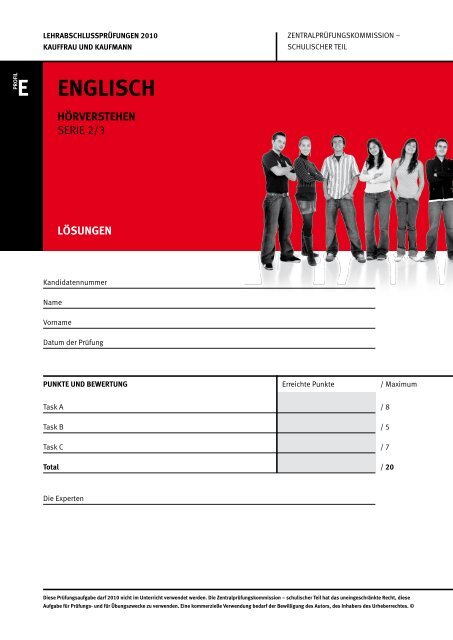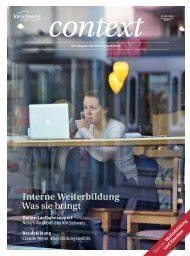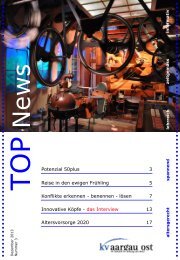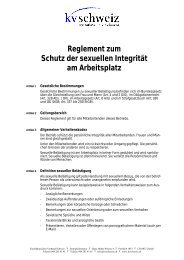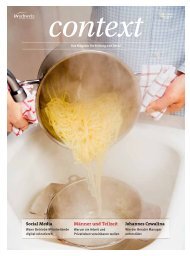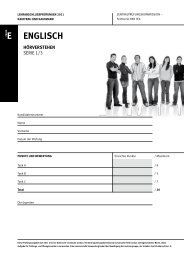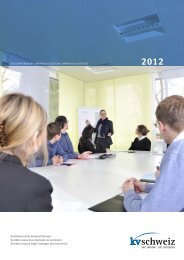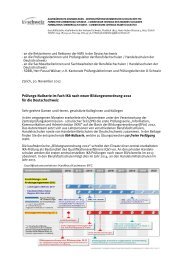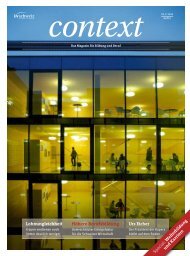e engLisch hörverstehen - KV Schweiz
e engLisch hörverstehen - KV Schweiz
e engLisch hörverstehen - KV Schweiz
Create successful ePaper yourself
Turn your PDF publications into a flip-book with our unique Google optimized e-Paper software.
Lehrabschlussprüfungen 2010Kauffrau und KaufmannZentralprüfungskommission –Schulischer Teil1Eenglisch<strong>hörverstehen</strong>Serie 2/3PunkteLösungenKandidatennummerNameVornameDatum der PrüfungPunkte und Bewertung Erreichte Punkte / MaximumTask A / 8Task B / 5Task C / 7Total / 20Die ExpertenDiese Prüfungsaufgabe darf 2010 nicht im Unterricht verwendet werden. Die Zentralprüfungskommission – schulischer Teil hat das uneingeschränkte Recht, dieseAufgabe für Prüfungs- und für Übungszwecke zu verwenden. Eine kommerzielle Verwendung bedarf der Bewilligung des Autors, des Inhabers des Urheberrechtes. ©
2 englisch <strong>hörverstehen</strong>! wichtig:In diesem Hörverstehen hören Sie die Aufgaben A bis C je zweimal.PunkteA (8 points) (1 Point for each correct answer)Look at the notes below. Listen to the messages and monologues.Fill in the missing information.1. A radio news reportKind of business Keller doesLoss in first half of year 1.Number of employees losing their jobs 2.Production of machineryCHF 45m165011Name of the company doing the survey 3. Equal Opportunities1Kind of jobs preferred by many women 4.part-time12. A message on a company answerphoneName of schoolLocation of school 5.Wednesday mornings the office opens at 6.Number to press if you got the wrong bill 7.Executive SchoolManchester9.302111Website of school 8. www. exec.co.uk1
englisch <strong>hörverstehen</strong>3B (5 points) (1 Point for each correct answer)PunkteListen to a marketing manager called Mark talking to his boss Rosie about market trends in thesales of sun-care products. For each question mark the best answer (A, B or C).Tick one answer only. You now have 30 seconds to look at the task.1. Sales of sun-care products4. ConsumersA m have risen by £8.5.A m aren’t aware of the health risks.B m X depend on the weather.B m don’t sunbathe anymore.C m are a conservative trend.C m X will pay more for a better product.2. Supermarkets5. They are advertisingA m have sold more sun-care products than A m mainly on TV because of higher sales.last year.B m X in newspapers, magazines and theB m X are selling more toiletry articles thaninternet.they used to.C m on holidays abroad.C m have sold less toiletry articles.3. Concerning sales of sun-care productsA m department stores lost turnover.B m X chemists have gained market share.C m chemists are the least expensive.1+11+11C Task C(7 points) (1 Point for each correct answer)A radio interview with Catherine Freeman, a specialist in Far Eastern Studies.Listen and answer the questions. Please use keywords.You now have 30 seconds to look at the task.1. Location of SumatraIndonesia2. What natural disaster occurred in 2004?tsunami3. Population of Sumatra46 million4. Main religionMuslim5. What is special about the west coast?animal and plant life (not: “volcano”)6. Name one kind of business destroyingthe natural forests.paper / palm oil (production)7. What other product is grown on Sumatra?coffee1111111
4Task A:1 A radio news reportWelcome to “Swiss Business News” for our English speaking listeners. Producers of machinery have been hit by the economic crisis, and Keller has had a lossof CHF 45m in the first half of the year. Therefore they are going to dismiss 1650 people worldwide, about 100 of them in Switzerland. The latest survey by“Equal Opportunities” shows that there are still substantially fewer women in managerial positions than men. One of the main reasons seems to be that toppositions don’t usually come as part-time jobs, which would suit women better, especially if they have children.Punkte2 A message on a company answerphoneWelcome to The Executive School situated in Manchester. Our office hours are Monday to Friday from 9.30am to 5pm and Saturdays from 9 to 12. If you needinformation about our courses, press 1. If you have a question concerning your invoice, please press 2. For any other kind of information, press 3. Calling outsideoffice hours? Just visit us on our website. www.exec.co.uk. That’s W–W–W–dot–E–X–E–C–dot–C–O–dot–U–K. Thank you for calling.Task B:A: Hi, Mark, please sit down. Now then, how are our sun-care products selling?M: Over the last 5 years sales of sun-tan creams and lotions have gradually risen from £8.5m to £12.2m. This is mainly due to the record amount of sunshinewe’ve had in these years.A: Which may be the result of global warming and therefore is likely to continue.M: Hm, but climatic trends are difficult to predict, so I’ve made a fairly conservative projection of £12.6m for next year.A: Is this trend the same for all kinds of outlets?M: No. What’s interesting, although toiletry sales through supermarkets are rising rapidly, this is not the case with our sun-care products. In fact, supermarketshave sold 5% less than the previous year.A: So where was most of the business done, then? In department stores?M: Not there either. Their sales have remained steady for the last two years. But there has been a sharp increase in sales from chemists.A: Really? That surprises me, since they are usually the most expensive.M: That’s right. But consumers are becoming increasingly aware of the health risks involved in sunbathing.A: There has been a lot of talk about skin cancer on TV and the radio lately.M: Yes, and for good reason. The number of people who suffer from it has more than doubled during the last two decades. As a result a lot of people want tobuy products which offer greater protection even though they are more costly.A: Can’t you get those products at supermarkets?M: Not always. Supermarkets usually stick to those articles which sell in huge quantities, which isn’t the case for a sun-tan lotion with a protection factor of50. And probably some of the people also would like to get professional advice since sunbathing isn’t as harmless as it used to be.A: In spite of all that, I suppose we still have to spend a lot on advertising, don’t we?M: Of course, after all we are not the only producers of sun-care products, and people could turn to other brands.A: How much do we spend on advertising, and where?M: The good news is that we have been able to cut costs here by about 10% and still increase our turnover.A: Very good. How do you explain that?M: Our experiment with TV ads two years ago did not lead to much higher sales. So we’ve been concentrating on press advertising on the one hand, whichenables us to target consumers with medium and higher incomes.A: You mean those who go on holidays abroad where they need sun-protection more urgently than here?M: Precisely. And secondly we’ve started to use the internet for advertising as well. Here we aim at a somewhat younger part of the population.A: Very good. And what about (fading out) . . .Task C:I: Today my guest is Catherine Freeman, specialist in Far Eastern Studies at Oxford University. Catherine you have just come back from Sumatra, which Iunderstand is one of your favourite islands, isn’t it?C: Yes, definitely. Although many people might not know where it is, it’s actually quite big with 470,000 km 2 . It’s the largest island in Indonesia and the sixthlargest in the world.I: Wasn’t it hit by a tsunami?C: Yes, in 2004, on December 26, Sumatra’s west coast was destroyed by an almost 15m high tsunami wave killing 150 000 people in Indonesia, most ofthem on Sumatra.I: How many people live on Sumatra?C: There are about 46 million people speaking 52 different languages.I: That makes for quite a variety!C: Yes, but many of the languages are closely related and most of these ethnic groups share similar traditions. A majority of 87% are Muslims, while 10% areChristians, 2% Buddhist and 1% Hindu.I: Are there any mountains?C: Yes. Along the whole west coast there is a mountain range. Its highest peak is the still active volcano Mount Kerinci which is 3805m high. But what makesthis region really special is its animal and plant life.I: Like the Sumatran tiger, orang-utan, rhinoceros, elephant and many others.C: Exactly. The sad thing is that apart from the elephant all these animals you mentioned are critically endangered meaning that their survival is highly threatenedand unsure.I: Why is this?C: Since 1985 the island has lost 48% of its natural tropical rain forest. One reason for that is that paper companies are cutting down trees for paper production,another is that palm oil companies are cutting down the original forest to plant oil palms instead. One way or the other, there is less and less roomwhere those animals can live.I: Is nobody doing anything to stop this development?C: Well, in October 2008 the Indonesian government announced a plan to protect the remaining forests, which was good news, of course. But the constructionof illegal roads and cutting down of trees has continued in spite of this.I: What other sources of income are there on this island?C: Sumatra is the largest producer of Indonesian coffee. In the highlands they grow Arabica coffee and in the lowlands another type of coffee called Robusta,is planted. Then they also have some petroleum as well as coal and gold.I: Thank you, Catherine, for the information.


